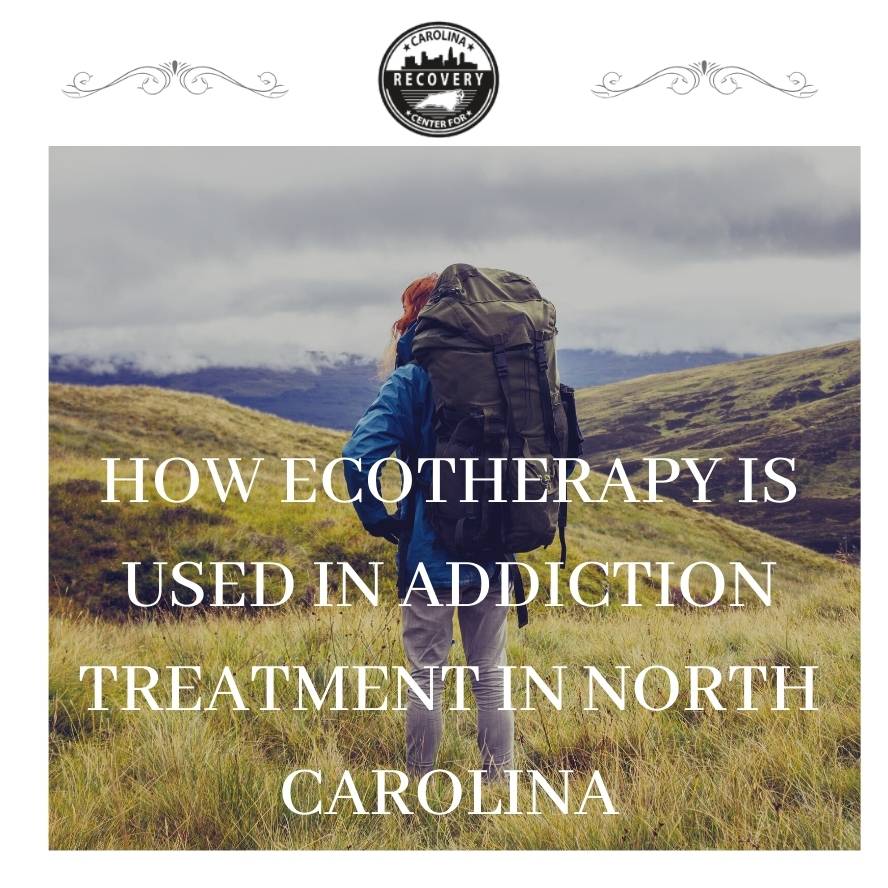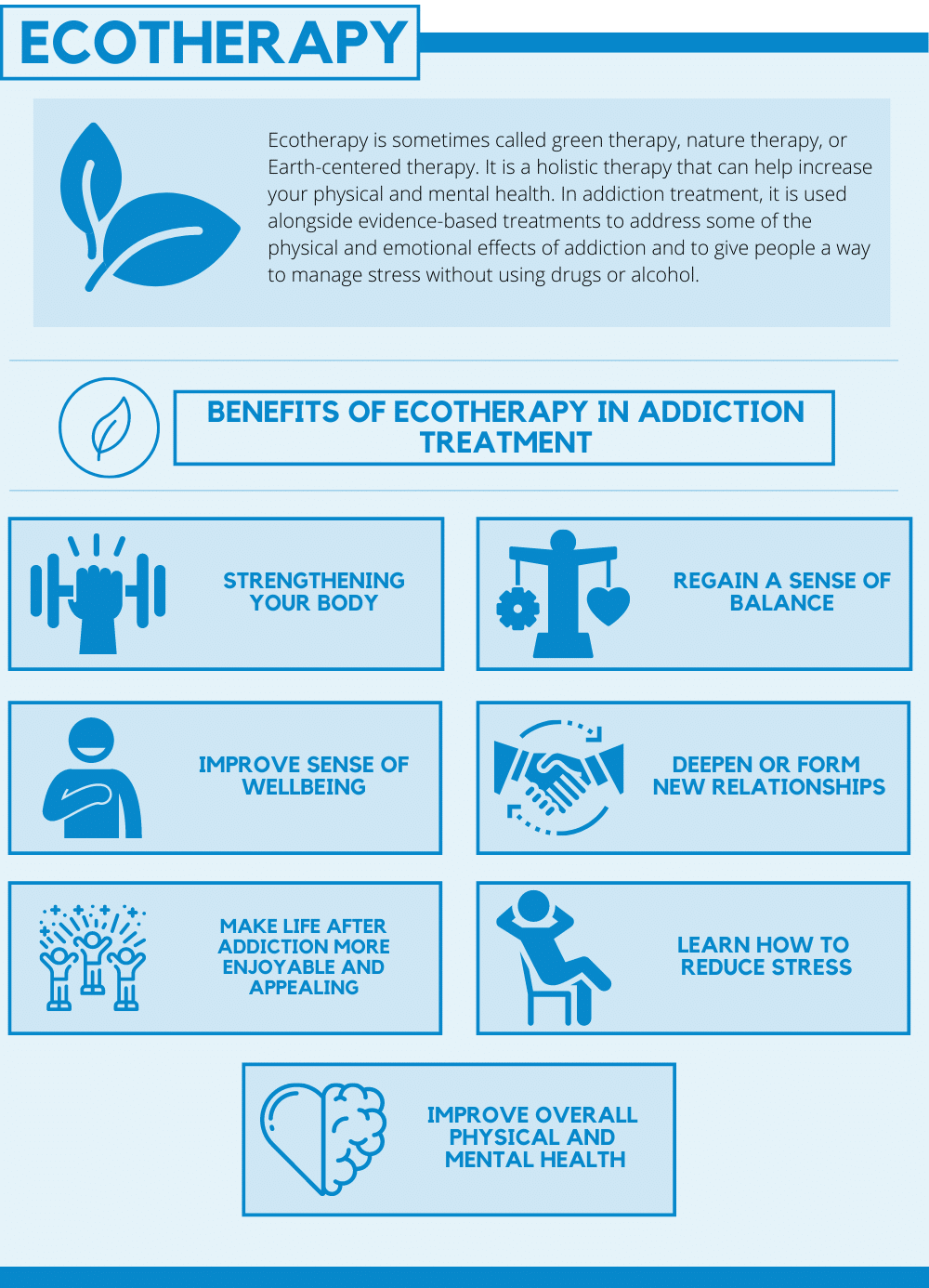How Ecotherapy is Used in Addiction Treatment in North Carolina

Medically Verified: 2/1/24
Medical Reviewer
Chief Editor

All of the information on this page has been reviewed and verified by a certified addiction professional.
Addiction is a condition that touches every aspect of a person’s life. It impacts their physical, emotional, and social health, and can have a ripple effect on the people and community around them. Each person has their own journey through addiction and recovery, and substance abuse treatment should be adaptable to meet people’s unique needs.
Good treatment programs do not just stop after medical detox. In addition to medical care and talk therapy, holistic practices can enhance a treatment program and give people the best chance to recover fully. Holistic therapies are practices that care for the person’s whole self–body, mind, and spirit. When used alongside evidence-based treatment approaches, they can keep people comfortable during the first stages of addiction treatment and give people the skills they need for lifelong recovery.
Commonly used holistic therapies include practices like yoga, meditation, acupuncture, and ecotherapy. Ecotherapy in addiction treatment allows people to connect with nature as part of their whole-self healing process. It is a powerful holistic tool with strong roots in science and can be easily incorporated into any addiction treatment program.

What is Ecotherapy?
Ecotherapy is sometimes called green therapy, nature therapy, or Earth-centered therapy. It is a holistic therapy that can help increase your physical and mental health. In addiction treatment, it is used alongside evidence-based treatments to address some of the physical and emotional effects of addiction and to give people a way to manage stress without using drugs or alcohol.
Simply put, ecotherapy involves practices that encourage a deep, meaningful connection with nature. It can occur in any setting, whether you live deep in the heart of a large city or in the open wilderness in North Carolina. One of the beliefs of ecotherapy is that humans are meant to live immersed in nature, and by regaining our connection to the natural world, we can live more full, healthy, balanced lives.
Benefits of Ecotherapy in Addiction Treatment
One of the most important goals of addiction treatment is to give people the skills they need to live their lives without using substances. For many people, this means that they need to learn some basic, essential tools to reduce stress and cope with change or frustration. Ecotherapy can be an effective tool in helping people cope with challenging emotions and to build self-esteem. Other benefits of ecotherapy as part of addiction treatment include:
- Strengthening your body
- Regain a sense of balance
- Improve sense of wellbeing
- Deepen or form new relationships
- Make life after addiction more enjoyable and appealing
- Learn how to reduce stress
- Improve overall physical and mental health
Ecotherapy is a simple but effective tool to improve many aspects of a person’s life during and after addiction treatment. Because ecotherapy is so adaptable, many people find it easy to incorporate this practice into their daily lives.
How to Use Ecotherapy in Addiction Treatment
During addiction treatment, people experience a rebalancing of their physical bodies, gain skills to cope with their emotions and get to practice living their lives without returning to substance use. One of the most important goals of substance abuse treatment is to give people the skills they need to avoid relapsing in the future. Ecotherapy can be an important part of reducing anxiety and depression, which also reduces the likelihood of relapse.
Incorporating ecotherapy into your life is easy, whether you live in a natural setting or an urban one. If you live in North Carolina, there are ample opportunities to get outside and hike in the hills and forests. Other ideas for getting some ecotherapy no matter your location include:
- Exercise outdoors–walk in your neighborhood, explore local parks, or stroll near a stream, lake, or seaside
- Plant and maintain a garden
- Animal therapy–ride horses, care for pets, or feed birds
- Outdoor yoga or meditation classes
- Swim outdoors–in natural bodies of water or outdoor pools
If you cannot easily spend time outdoors, there are simple ways to incorporate ecotherapy into your everyday life. These include:
- Growing herbs or vegetables indoors
- Listening to natural sounds while reading or spending time at home
- Observing nature outside your windows–notice the color of the sky, watch birds, notice the leaves on the trees changing colors, pay attention to the wind in the trees or grass
- Keep a nature journal of the changes of season or other natural events
- Hang up paintings with pictures of trees, the sky, or other natural scenes
During addiction treatment, ecotherapy is a simple way to enhance the benefits of evidence-based therapies. It can also be an effective way to maintain balance and reduce stress for the rest of your life.
Learn More About Ecotherapy at the Carolina Center for Recovery
If you or someone you love require addiction treatment, you are not alone. At the Carolina Center for Recovery, we offer programs that help support people at any point in their recovery journey. Our evidence-based and holistic programs can support your physical, emotional, and spiritual health as you learn how to live without substances. Call our admissions counselors today to get started.

